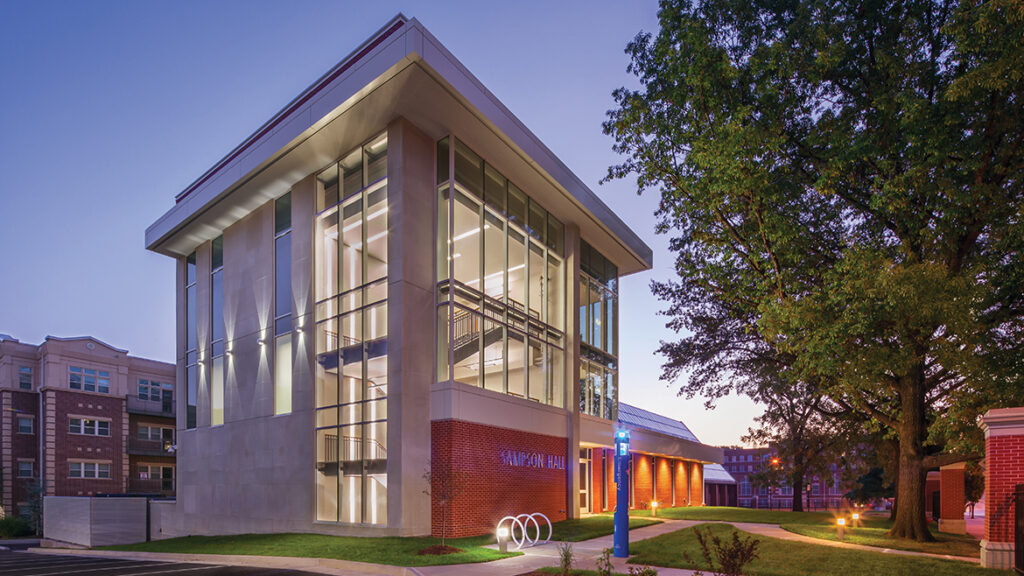According to a research article in The Atlantic, we saw “health care surpass manufacturing and retail, the most significant job engines of the 20th century, to become the largest source of jobs in the U.S.” in 2017. Data from the Bureau of Labor Statistics reveals that this growth will continue as the health care industry expands to account for one third of the nation’s job growth from now until 2026.
Rebecca Kline, director of marketing at Stephens College, explains how statistics such as these inspired the college to develop a School of Health Sciences to help students take advantage of this trend. “We were looking at health care and ways we can prepare students because health care is going to grow,” says Kline.
Despite the projected growth for health care, the Bureau of Labor Statistics also anticipates a nursing shortage of 1.2 million by 2022; hospitals and health care systems as a whole will continue to struggle with shortages in primary care physicians, nurses, and home health aides. Hopefully, programs like Stephens’ can help fill the gap.
THE HEALTH CARE OF TOMORROW
Health care is changing and evolving. The skyrocketing growth of the health care industry also comes with soaring costs that are forcing “everyone to look at all the alternatives for health care providers,” says Kline. This is opening doors for students by offering them more degree options.
One alternative degree program that the Stephens School of Health Sciences offers is the Master of Physician Assistant Studies, a graduate program, started only two years ago, for students who want to become licensed health care providers.
“They [physician assistants] can diagnose illnesses and help develop treatment plans,” says Kline. “They are often the principal health care providers for many patients, especially in rural areas.”
“They can write prescriptions, with some restrictions on a few medications,” adds Eric Johnson, a licensed PA and director of the program.
The first class from the PA program, consisting of 20 students, graduated in December. “We know that 18 of those students have already passed their national board exams, and we just haven’t yet gotten the test results back for the other two,” says Johnson.
Fourteen students secured employment prior to graduation in areas ranging from emergency medicine, orthopedics, and pulmonary-critical care to psychiatry, dermatology, and sleep medicine. Of the remaining six students, three elected to complete a fellowship at MU to further their education.
When it comes to graduates from similar programs outside of Stephens, Johnson explains that the national average for job placement is about 33 percent. With a job placement rate of twice that, the Stephens’ PA program is certainly something to boast about. “The clinical rotations [part of the PA program] really help with job placement because students often find places where they want to stay,” Kline says.
Stephens will also help students secure jobs in the field of medicine. “The tuition costs are much lower than the tuition cost of medical school, and yet the payoff is still quite high,” Kline says.
MORE THAN ONE OPTION
Another degree option within the School of Health Sciences is health information administration.
“It’s one of the programs that most people probably don’t think about,” Kline says. It takes a large staff to maintain the computer systems at hospitals, and members of that staff need to be well versed in both the technical skills and the medical terminology required for such positions.
“This option is popular with ‘career changers’ or with nurses who want to make a change and get off their feet,” says Kline. This degree can also be completed entirely online.
“More and more students are becoming interested in the broader health sciences,” says Kline. “Exercise science is popular, as are our pre-physical therapy classes, pre-OTA [occupational therapy assistant], pre-PA, etc.”
The enrollment numbers bear further witness that the current opportunities provided by Stephens are in high demand. In August 2018, the cap for the PA program was increased to 30 students. “We had almost 900 applications for those 30 seats,” says Johnson. “It’s very competitive.
Stephens College
1200 E. Broadway
573-442-2211
stephens.edu










